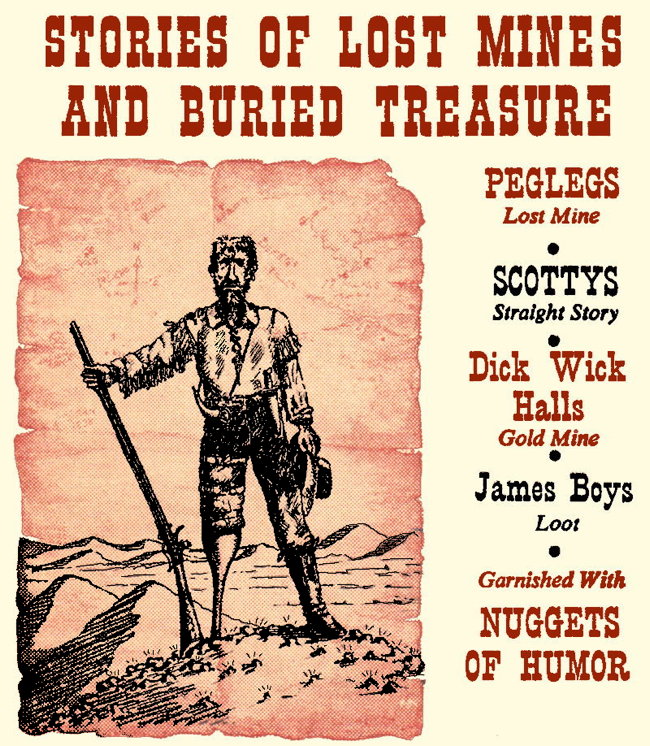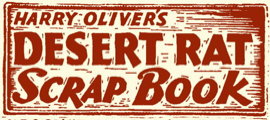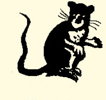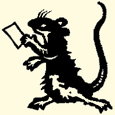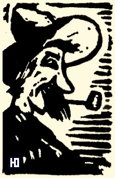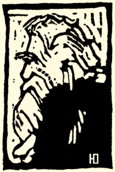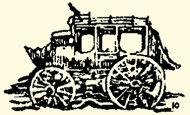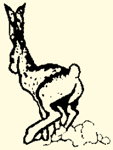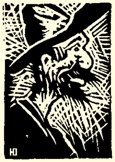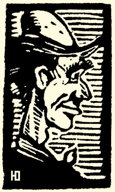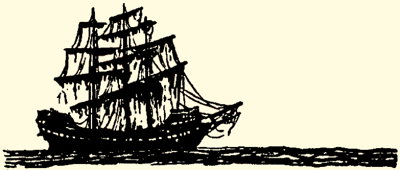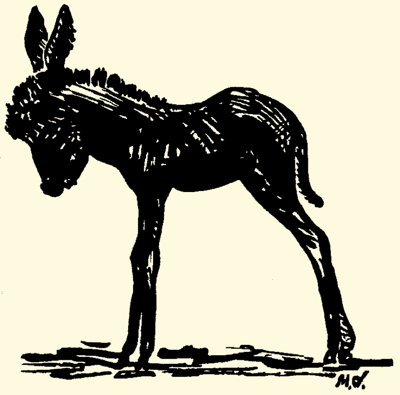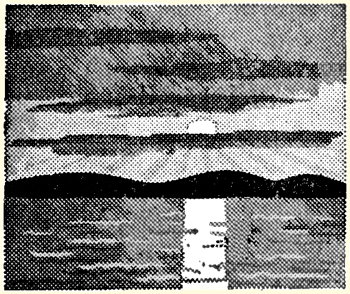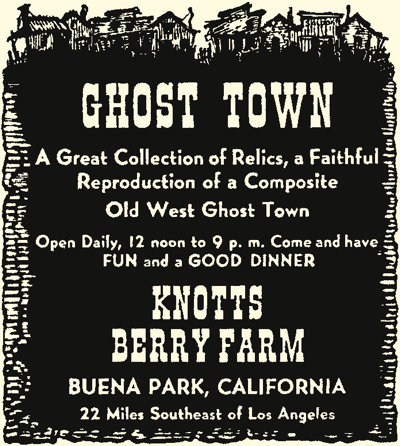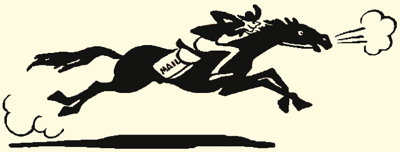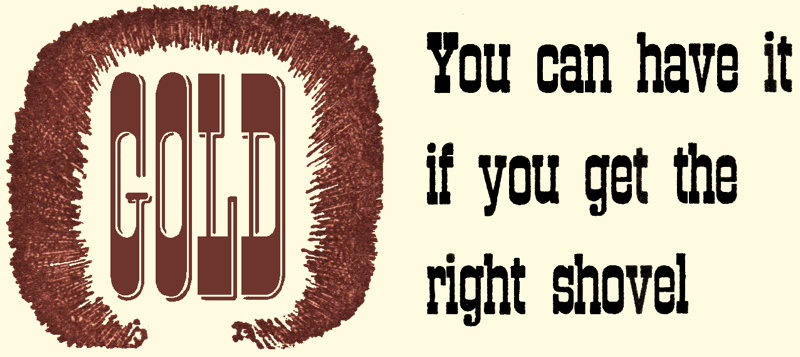BACK HOME COVER THIS IS HISTORICAL INFORMATION ONLY
PRICE 10 CENTS . . . . . . . ONLY ONE LOUSY THIN DIME
PACKET FOUR OF POUCH THREE
Gold is where you find it Packet
PUBLISHED FOUR TIMES A YEAR
ONLY NEWSPAPER IN AMERICA YOU CAN OPEN IN THE WIND
DESERT RAT SCRAP BOOKPAGE 2
Smallest newspaper in the world and the only 5 page one.
Packet Four of Pouch Three
![]()
This paper is not entered as 2nd class mail. It's a first class newspaper.
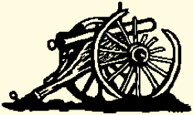
A paper that grows on you as you as you turn each page . . . excepting page 5
Pictures are by the author, many of them are woodcuts.
I did all but the spelling.
![]()
Not one of these names or places is COINCIDENTAL.
THIS IS IT!
|
THE MAIL |
Packet three of pouch three of D. R. S. B. states that many sheepherders go nuts. Do you know what drives them crazy? It is trying to find the long way of a square quilt.
Louise Eaton, Holtville
SMOKING AND DRINKING
The biggest pain-in-the-neck about smoking is a fellow I know, who never smoked in his life. In the 30 or 40 years I've known this man, he has made more people miserable than any ten men could smoking.
The teetotalers exaggerate what drink does to a man. They are always harping about drink changing a man into a monster. I have done a few ornery things when drinking, but they were all well planned when I was absolutely sober.
When I am drinking, I am me, just me, and you are you, just you. And so if you are a disagreeable person when you are drinking, that's you, you are a disagreeable person.
Your Editor likes people with good honest vices—out in the open.
![]()
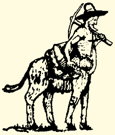
The only way to know anything about a lost mine is to go to just one man. If you go to two, what you know is reduced by half. Go to three and you don't know anything.
![]()
SQUAW WOOD
Like Steve Allen this paper is habit-forming, and will get you nowhere . . . but easier on the eyes than T. V.
![]()
The picture on the cover—some fool drew PEGLEG all over an old map that might tell just where to look for his gold.
See story Page 4
![]()
In my lifetime only two men have kept the center of the stage (The Front Page of the Papers) for 50 years—Death Valley Scotty and George Bernard Shaw—50 years is a long time.
Your Editor
THE POOR PUBLISHER
Tilford Moots was over t' th' Henryville poor farm th'other day t' see an ole friend o' his thet used to' publish a newspaper thet pleased everbuddy. ABE MARTIN—1906.
 Nothing like mining your own mind for nuggets of happiness. Twice told tales are like refined gold—better than virgin.
Nothing like mining your own mind for nuggets of happiness. Twice told tales are like refined gold—better than virgin.
Dick Joslin
The beauty of the old-fashioned blacksmith was that when you brought him your horse to be shod he didn't think of no other things that ought to be done to it.
Sunshine Magazine
![]()
A Cheyenne, Wyoming, paper reported on an Indian gathering: "An Indian woman squatted over a firre in one tepee, and you could smell fresh meat cooking.
Your old editor climbed the hill to see "Sky-Eye" Jones, the old timer that fixed himself a telescope out of a hollow log.
"I will talk while you get your breath," said my star-gazing friend.
"The closest the moon can come to the earth is 221,463 miles. There are 40 billion stars in our universe, and our universe is only one of 75 million, (which should give you an idea of how important you are)" he said, smiling.
"But how about saucers," I asked. "How about all the stories people are telling about saucers?"
"Sure," he said, "let 'em talk. I can't drink out of a blooming cup with these whiskers.
![]()
L. S. (Tex) Crosse tells me that in the old days the roads in Nevada were longer in the wet season—and would shrink in the dry season—saving as much as ten miles in sixty.
Some folk seem toget the idea they're worth a lot of money just because they have it.
Beth Parker
![]()
The only man in Imperial Valley who ever kicked a jackrabbit while it was running is Gordon Stuart, he says.
![]()
PEGLEG SMITH IN BRONZE
Blackie Says:
Cyria Henderson, sculptress-wife of the Desert Magazine editor, was one of those who sat around the campfire in Borrego Valley last New Year's Eve and listened to the tall tales in the annual Liar's Contest. During the evening Harry Oliver, master of ceremonies, suggested that Cyria create a miniture Pegleg to be given as a trophy at the next Liar's party, January 1, 1951. Ray Hetherington, speaking for Walter Knott of Knott's Berry Farm, volunteered to have the small statue cast and bronzed. The trophy is nearly completed—and it is a real work of art according to those who haave seen the model.
![]()
This packet of the Scrap Book was printed on the Desert Magazine press at Palm Desert, California—just eight miles from Fort Oliver over the new road across the Coachella Valley sand dunes.
PACKET 4 POUCH 2 Harry Oliver's DESERT RAT SCRAP BOOK PAGE 2
GOLD
The old desert prospectors who search desert sands for gold want only the fun of finding it, not what gold will bring them—but it's strange how much they know of gold. I was given this to read by an old-timer here today. Since 1492, the year Columbus discovered America, the total amount of gold produced in the whole world has been twenty-two billions and a half. But today, in gold money and gold bullion, there are only twelve billions of this vast amount accounted for. Where is the rest, the vanished ten billions? Much of it has gone into industry. Fortunes in gold leaf have been laid in the crosses and domes of churches, cathedrals and mosques.
Gold is restless and everlastingly seeks a change. It changes its form and place, and yet endures. For even the gold setting of a woman's bracelet or the gold in a man's watch may have once have glittered from the walls of Solomon's Temple, or shone on the shaven heads of the priests of Isis in old Egypt, or have been snatched from some burning city of the Spanish Main to the tragic accompaniment of the shrieks of dying men and the screams of captured women.
![]()
Jake Topper, Desert Rat, journeyed to Los Angeles with hopes of selling a mine, WHICH HE DIDN'T, and ran out of money. He told his woes to an old whiskered fellow who looked like he might be a prospector and was offered a suggestion of how to get a dollar right now. The city old timer said, "all you have to do is go to the Mission and crawl up the aisle on your hands and knees and give yourself to God." The evangelist will hand you a dollar.
Jake Topper shrugged his shoulders, saying, "I've worked in a three foot drift 500 feet below ground for years, on my knees, too, but, I couldn't get that low for no man's dollar.
![]()
Desert Treasure
Treasure sticks out of the ground in the Desert of Salton Sink, says Ole "Hi Grade" Nordland, editor of the Indio Date Palm. Nordland tells of the famed black date of Shield's Date Garden (precious jewels these dates, at 5c each and you can have only one). Nordland also tells of Russ Nichol's giant male date palm, King Solomon. This much married rascal, he says, loves the music of Artie Shaw.
![]()
PIONEERTOWN
Motion Picture Village
40 miles from Fort Oliver
Henry Jew, the Chinese cowboy, and owner of the Golden Stallion Cafe, took a quick trip to Mexico Sunday, April 11th, for the sole purpose of getting married, which he did. Henry's bride was a very cute Chinese girl, Julia Lee, who is a citizen of Mexico. From latest reports, Henry is quite happy, except for the fact that his bride must remain in Mexico until naturalizatioin papers have been completed.
JOSHUA JOURNAL
![]()
I like to do business with smart people. My claim in California is not so big on top but the man told me ti goes straight down for four thousand miles.
By Charlie Eightfloor
![]()
DON'T FENCE ME IN
By Rob't W. Denny
When this old soul hunts range and rest,
Far beyond the Great Divide,
Just plant me in some stretch of the West
That's sunny, long and wide.
Let the cattle rub my tombstone down;
And the coyotes mourn for their kin;
Let the hawses come and paw the moun',
But damn it, don't fence me in."
DICK WICK HALL'S
Mine Was Lost as Stockholders Look on
Dick Wick Hall, Miner, Promoter and Desert Humorist of Salome, Arizona, some thirty years ago, whose stories appeared in the Saturday Evening Post—and made Salome famous is also remembered by some of us old timers for his great gold promotion.
Dick discovered gold on three sides of a small mountain sitting out in the desert and as digging was hard and slow in the hot summer sun, he figured a way to do the job in a big way.
His way was simple, a hundred people put in a hundred dollars each (but he didn't want poors people's money), all the money to be spent for dynamite, the stockholders to be on hand, to walk in and pick up their own gold on the day set for the blast.
The day came and so did the stockholders; there was never anything like it (but maybe the A-bomb); some said there was a tidal wave went up the Colorado River sixty miles away.
After the dust settled, the stockholders went in to pick up their gold, but there was no gold—a few showed their disappointment — some talked nasty—but an alert deputy sheriff from Yuma, stepped up on a large rock—the men gathered around him, as he said—"Fellows, you have had weeks of dreams, enthusiasm and anticipation—you saw and heard the greatest blast you will ever see—and by dam, you got something to talk about the rest of your life—let's give three big cheers for Dick Wick Hall.
![]()

The chief difference between a wise man and an ignorant one is, not that the first is acquainted with regions invisible to the second, away from common sight and interest, but that he understands the common things which the second only sees.
Starr King
![]()
Prospectors in the Air
Nuggets in the air, the Bonanza Air Lines don't stop for no prospectors to do any mining, but they do fly over the best gold country in the west—from Phoenix to Reno.
![]()
Blackie & Friend on Palm Springs
TRAMWAY
 Frank Bogart says—That from the Tramway with a pair of strong glasses you will be able to see Mecca. Blackie wonders what he could see with a quart.
Frank Bogart says—That from the Tramway with a pair of strong glasses you will be able to see Mecca. Blackie wonders what he could see with a quart.
• • •
Blackie says "Le've me alone, I'm practicing," as he pointed to this bit of Chinese philosophy:
"If you can spend a perfectly useless afternoon in a perfectly useless manner, you have learned how to live."
Lin Yu Tang
![]()
Wimmin and Cows
A handlebar-mustached veteran of the brush country cow-days along the Nueces bottoms in Texas was visiting his daughter-in-law. The 90-year-old rawhider was a bit lame from the old days of breaking horses and punching cows, but his mind was as bright as a Colorado dollar at high noon, full sun. The daughter-in-law had a card party one Thursday after the morning baking. The old man just "set' on the porch all during the afternoon hen party. And, afterward, he was making conversation about it and came to comparing the intelligene of women with the intelligene of cows ("Both being breeding animals," he said).
"A crowd of wimmin attendin' a party brought their babies along, some even, unweaned. They slacked 'em in the spare room off the dinin' room. And you know, one of them youngsters suddenly let out a holler and every one of them young wimmen jumps up and runs to see if it was her offspring that's belllerin". . . . Yet, I've rode herd on a thousand cows of a dark night like as to you can't see the horn on your saddle; — one little old half-weaned calf can wander off tho the edge of a herd, find itself lost and set up a beller. — And one old cow — jest one, the calf's mama — will quit anything she's doin' and come out to claim it . . . I cain't see as women are as smart as cows. Evvybody should be with enough sense to know kin, especially little ones."
Ken McClure, San Antonio, Texas, The Pioneer Gazette
The Spanish Galleon Of Salton Sea
This story comes from an account of one year in the life of Señor Don Juan Obregon. Born at San Jose del Arroyo, Lower California, Mexico, in 1798.
Written down by Antonio de Fierro Blanco in the book "Journey of the Flame."
• • •
To be in camp meant more or less idleness, and that brought out stories of past adventures; for all of our men had spent their lives as guards or packers for Spanish explorers, and were full to their necks with truths, chismes, and imaginations.
One of them, Tiburcio Manquerna, took me apart with much secrecy to relate a tale concerning our celebrated pilot Iturbe, who was first to sail along our California Gulf Coast, fishing vast quantities of pearls; also buying many other bushels of these jewels from natives for old clothes and wormy ship's biscuit. This hard bread was especially valued by the Indians, and brought a higher price in jewels if the biscuits were so full of maggots that they coud run abut the ship's deck on their own legs; since it was then esteemed as fresh meat.
Señor Iturbe, being explorer for our King and pearler on his own account, first loaded his fifty-ton shop with a sufficiently great fortune in pearls and then sailed on past San Felipe; but found no Colorado River mouth, as later our padres, Kino and Ugarte, in their ship Triumph of the Cross, mapped this gulf. Instead of a river mouth, Iturbe saw a vast sea extending far inland, and with high mountains on each side. Iturbe was certain he had found the Straits of Anian, long sought, often found, and as often again lost, and by which he could pass his ship from the Pacific to the Atlantic Ocean. Iturbe sailed on and on up this vast sea but slowly, as there was little wind and intense heat. A month he spent aground on a sandbar, when a great cloudburst, rushing down from high mountains, filled a part of this inland sea with its debris and created such vast waves that his vessel became unmanageable. Two months he passed on land where the water ended, attempting to locate any continuation of this supposed Straits of Anian, and seeing from the highesst mountain-top a vast body of water winding toward the northeast, but the entrance to which he cold not find.
Then other weeks he occupied in drying flesh from antelope and wild sheep, since they were nearly out of provisions. Still dreaming that each of his crew would be ennobled (Hijosdalgos) by the King for his great discovery, and that he might ask what he would, since there was fame and fortune for any discoverer of these Straits, Señor Iturbe sailed south, only to find arid sand where he had entered this inland sea from the Gulf of Cortes, and as now they call our Vermillion Sea.
Cursing that sorcerer who had lured them into his trap, he attempted again to sail around this landlocked ocean, looking for an entrance to the Vermillion Sea, or perhaps to that continuation of the Straits of Anian he had seen from a mountain-top. His voyage ended when his ship grounded, and the water receding as if by enchantment, stranded them on soft and boggy ground from which with difficulty they escaped alive. They left their ship and its vast treasure of pearls upright as though sailing, but with its keel buried in sand.
All this Manquerna told me fluently as of a story often heard or oft repeated, and later I learned from Don Firmin Sanhudo that in 1614, Iturbe had made such a pearling trip and lost his vessel. Now came Manquerna's personal narrative, and he almost wept lest I doubt his truth.
"As a boy," said Manquerna, "I went from Sinaloa to drive mules for Juan Bautista de Anza, whom the King had sent to discover a land route from Sonora to Alta California. After we had with difficulty traveled through Pirmaria Alta, we came to sandy wastes and crossed a great river with still more sterile deserts beyond it. Being the lightest in weight, I was sent to the right of our course, on our best remaining mule, seeking a road to the ocean.
"Traveling by night because of the heat, I stumbled upon an ancient ship, and in its hold so many pearls as is beyond imagination. Fevered by this wealth, I abandoned my comrades, and riding toward the ocean as far as my mule could carry me, I climbed the precipitous western mountains on foot. Fed by Indians, I at last reached San Luis Rey Mission. Since then I have spent my life searching for this ship. Help me, or speak to Don Firmin Sanhudo, for me, and a half of what we find shall be yours."
I was polite, and promised such aid a I could give, but warned Don Firmin; since a man is but a boy grown up. If he abandons his comrades in a pathless, waterless desert before his beard grows, he will do the same later when his hair is gray.
Scottys Straight Story
From George Palmer Putnam's Book--
DEATH VALLEY and its Country
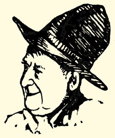 Once a newspaperman went to the Castle.
Once a newspaperman went to the Castle.
"Scotty," he said, "Mr. Hearst has told me to write your straight story. From the beginning to date. No matter how long it takes, I'm to dig up the facts."
Scotty gave his visitor half a dozen names. They were men of Reno, Las Vegas, San Francisco, Los Angeles, Chicago.
Weeks later the writer returned.
"See 'em all?" Scotty asked.
The writer nodded. "Every one of them. They all talked, too, very cooperative"
"That's fine," said Scotty. "Between 'em they know all about me."
"The trouboe is," the reporter went on, "each one told me an altoghehter differeent story.'"
Which is the way it is. And, I think, likely evermore shall be.
George Palmer Putnam
![]()
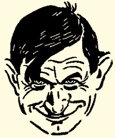
Will Rogers once said—I use only one set method in my little gags, and that is to try and keep to the truth. Of course you can exaggerate it, but what you say must be based on truth.
Off His Range
On a trip down into the Arizona desert country this past month a Navajo told me about the old hermit who died recently when he wandered out of the hills and saw an auto for the first time. He didn't see it soon enough.
Thanks to Curt Skinner, Chief Ranger, Yellowstone Park.
![]()
A tourist trying to talk with Old Deef Dan, gave up, saying:
"It's no use—you're as deaf as a post."
(Deef Dan)—No, sir, don't believe in 'em."
"Don't believe in what?"
(Deef Dan)—"Ghosts—No, sir, nothin to be afraid of. A skeleton's nothing but a stack of bones with the people scraped off."
![]()
"These wolves are like railroad trains," said Pirtleville Pearl, "you like to hear the whistle even if you don't want to go any place!"
From th' Brewery Gulch Gazette
![]()
Hidden Treasure
Last spring Mrs. Dave Needham of Holtville purchased a riding mare. As months passed, the animal became more and more averse to working. In time it dawned on the Needhams that they had hidden treasure—a blessed vent was soon to occur. Excitement ran high. What a wonderful Christmas present it touls be! And sure enough one morning there was the foal—as cute little jack as any one could desire.
Louise Eaton
PAGE 4 TREASURE PACKET
This page is dedicated to the World's Greatest Optimist—the Desert Prospector
Harry Oliver's
DESERT RAT Scrap Book
WEST STILL WILD
— from the pages of Harry Carr's great book, The West Is Still Wild, Houghton Mifflin Co., New York. A line and a sketch.
The line from Chapter XXV El Dorado "La Golondrina" was drowned out by "Oh, Susanna.."
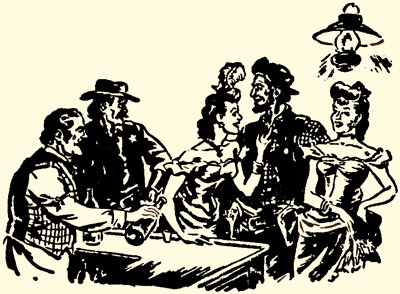 This is the story of the hottest sport of the Mother Lode country. He, too, lived in Columbia. His name was Nate Arnold. He came ambling into the gold country one day in the fifties. He had an air of sang-froid and a permanent aversion to work.
This is the story of the hottest sport of the Mother Lode country. He, too, lived in Columbia. His name was Nate Arnold. He came ambling into the gold country one day in the fifties. He had an air of sang-froid and a permanent aversion to work.
One day, coming back from a drunken party he stumbled over a rock. It proved to be one of the largest nuggets ever found in the Mother lode. Eventually he dug eighty thousand dollars out of the claim he staked. When he got the assay report, Nate hired a brass band and gave a one-man parade. Then he marched into Long Som's Bar at Columbia and paid for a drink with a twenty-dollar gold piece—no change expected. He never stopped paying twenty-dollar gold pieces for drinks. That was his standard price.
Some of his friends tried to get him to save his money; but Nate replied that he was now about to satisfy his life's ambition, which was to own a fast horse, a fast woman, and a fighting dog. He had a buggy made to order with red wheels; bought a hi-stepping horse and a harness mounted with solid gold; married a pretty Mexican girl from the Gulch, and sent East for the ugliest bulldog ever seen in California.
All the bar-keepers waxed rich on Nate's twenty-dollar gold pieces before his money gave out. And presently it did give out. His pay streak pinched out. Then Nate went the rounds of the saloons trying to borrow money off the bar-keepers he had enriched. They fumbled—as they had always fumbled with his change.
His bulldog and horse disappeared. In the end, he and his little Mexican girl went hungry. But Nate never lost his elegance or his INSOUCIANCE. One day the little Mexican girl managed to dig up seventy-five cents and sent Nate to the market to buy some much-needed meat. He had spent the money to buy a live owl from an Indian. He said it was a cute little owl; and, anyhow, he had always wanted an owl.
One night they found Nate lying dead on the trail. His whiskey heart had suddenly given out.
The little Mexican girl went insane.
FURTHERANCE AND COMFORT OF LIFE IN
Shack, Shanty & Cabin
Tender Your Aid, You Rats, Send in Your Staff
Not Approved by Good Housekeeping
In building a shack, put your open fireplace in the corner,—so's when you burn long logs, the logs will lay along the wall and you won't stumble over them—saves a lot of woodcutting.—Your Editor.
• • •
Never put pepper on any kind of meat before cooking. Always pepper just before serving, to avoid having the spice become burned and distasteful—From Bill Magee's Western Barbecue Cookbook. Fond as he is of hot sause, Bill Magee advises to "lay off" all sauces for fine-flavored meat like venison.
• • •
You an get a purty fair idea of a woman's disposition from the way she scrapes out a pan.—(How did that woman get into this column?) but no matter.
• • •
The modern idea of roughing it is to have no radio in the shanty.
• • •
If your shack is in the desert and you pack in your water—put in two Tamarisk sticks, water them with waste water, running it through a keg of ashes and have yourself trees.
• • •
Was reading in an old, old cookbook: "When toast is burned, do not scrape with a knife—rub across a grater." Your editor has got a better idea of what to do with it!
• • •
Remember you can't fall out of bed if you sleep on the floor.
![]()
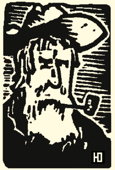
Old Captain Catnip Ashby, says — "The prospectors over near Quartzsite ain't mining much gold, but they are getting good television reception."
![]()
Wine in the Desert
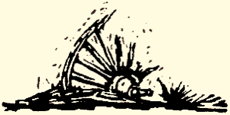 Somewhere under "The Algodones" fascinating sand dunes (20 miles west of Yuma, Arizona) near Gordon's Well. "Yes, it's true." Under its dunes is a freight wagon filled with the finest champagnes from France.
Somewhere under "The Algodones" fascinating sand dunes (20 miles west of Yuma, Arizona) near Gordon's Well. "Yes, it's true." Under its dunes is a freight wagon filled with the finest champagnes from France.
One of the most amusing of the desert tales is that of the freight wagon loaded with champagnes, bound for the tables of the dons in the pueblos of San Diego and Los Angeles. Crossing the sand dunes, the freighters were struck by a sudden violent sand storm. As the flying sand settled about the wagon, the drivers cut loose their mules and road on them before the storm and to safety. Returning later, they found only a sea of dunes where the wagon should have been, and never since has the cargo of champagne been seen.
DESERT BEACH
SALTON SEAPlay In the Sun, In the Water and Under the Wind
The SOUTH SEAS of the DESERT
250 Feet Below Sea Level
Swimming and Boating
Desert and Seashore Homesites
9½ Miles East of Mecca, California
Big Game Hunters
from the land of tired air
From page 197 Matt Weinstock's book, My L.A.
If you have read Matt's book you will enjoy reading this agin. If you have not read Matt's book get one and read this agin, and hundreds more like it.—Your Editor.
A few reporters were sitting in a small cafe, watching a cockroach track up a lemon meringue pie, speculating whether it would spell out Pepsi-Cola, as the skywriter does. A stranger sitting three stools away broke into their research. "Hey, Al, there he is again," he called to the proprietor. "Is it all right if I take a try at him?" Al said it was ok, he'd been trying to trap the so-an-so all day. The stranger pulled out a .25 automatic, took aim, and blasted at a large rat visible in the doorway to the kitchen. He missed, swore, replaced the gat, and resumed sipping his coffee. The newsmen almost fell off their shoots.
We are eagerly waiting for Matt's new book, "My So. Cal."
![]()
TEXANS
Report Finding
Lost Dutchman Mine
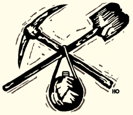 The famed Lost Dutchman mine, reputed to be located somewhere in the Superstition Mountains of Arizona, has been "found" again according to a statment given to the Houston, Texas, Chronicle by one of the locators.
The famed Lost Dutchman mine, reputed to be located somewhere in the Superstition Mountains of Arizona, has been "found" again according to a statment given to the Houston, Texas, Chronicle by one of the locators.
According to legend the mine was worked originally by members of the Peralta family of Mexico. After considerable gold had been taken from the rich deposit, the Apache Indians, resentful of the intrusion in their territory, attacked the mining party and massacred all but one of the workmen.
At a later date a German, Jacob Walz, reported that he had discovered the old Peralta workings, and exhibited rich gold ore to prove his claim. He never revealed its location.
Most recent claimants to rediscovery of the old workings are Robert C. Drury and O. T. Hanning, a mining engineer. They say they have located a 200-foot shaft about 20 miles from Casa Grande. It had been covered with mesquite. An old hand-made ladder leads into the mine. They assert they found gold in the ore at the bottom of the shaft, and believe that eventually they will locate a cache of arrastre-milled ore said to have been buried at the time of the Apache attack.
Desert Magazine
Only One World Famous
VALERIE JEAN
DATE SHOP
11 Miles South of Indio on Highway 99
or Please Mail Your Order
1 lb. Finest Dates and Confections, $1.30
3 Lbs. Finest Dates and Confections, $3.50
Including Delivery—Write for Folder
VALERIE JEAN DATE SHOP
THERMAL, CALIF.
Come in. This is Old Adobe Fort Oliver —home of this paper—stronghold of the secessionists—tabernacle of the Desert Liars Club and exploitation headquarters for the West's most colorful ghost, Pegleg Smith. Here on this old desk is my Peg Leg Scrap Book. For 35 years I have gathered items about the old rascal, many of the stories I have garnished a bit, as I gave them again to the press. But with others, I have been able to coax the old Ghost over to the spot that I picked for his monument in Borrego (Desert Ghost Herding, Blackie calls it).
Twenty years ago I planted 60 weathered wooden peg legs in likely spots to keep the famous Peg Leg Smith Lost Gold Legend on the front pages of the newspapers of the Southwest. (Most of them were found, and the Newspapers loved it.)
Today Peg Leg Smith is the best known Ghost in the West. Phillip A. Bailey's book "Golden Mirage" (1948) tells many stories of the tales, but I have picked for this packet one of the oldest printings I coud find. Here is George Wharton James in his "The Colorado Desert" (in two volumes 1906) quoting from the Los Angeles Herald of a much earlier date. It's best you start with the story as it was 60 years ago.
Where Is Pegleg Smiths Lost Mine
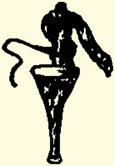 "This is the puzzling question which has caused many a fortune hunter to search the desert. Somewhere near three buttes that rise from the burning sands the gold lies easy of access. Wealth waits for the man who can find the spot where seventy years ago a party of weary and thirsty trappers camped over night.
"This is the puzzling question which has caused many a fortune hunter to search the desert. Somewhere near three buttes that rise from the burning sands the gold lies easy of access. Wealth waits for the man who can find the spot where seventy years ago a party of weary and thirsty trappers camped over night.
'The story of the lost mine has been told many times, but it has remained for one who is interested in the older West, to sift the facts, and this is the first authentic story ever pieced together;
T'was in the Year of 1836...
"In the year 1836 a man named Smith, and known as "Pegleg" Smith because he had lost one of his natural legs and wore a wooden one in its stead, with a party of trappers came from St Louis to the head of the Colorado River. They followed down that stream to the mouth of the Gila River and then struck off across the desert. From Yuma their course was in a southwesterly direction, across a wide stretch of desert, utterly devoid of vegetation, and with no sign of water or life of any kind. They traveled for three days toward some low hills, but as they pressed on they appeared to recede and be always about the same distane from them. At nightfall on the fourth day, however, they made their camp at the very base of the southernmost of the hills.
"In the dim, fading light they could faintly discern the tops of three small buttes to the northward, toward which a deep canyon led. They were nearly out of water, so one of their number was sent to explore the canyon to see if by any chance a spring of water was up there.
"Before long he had climbed to the top of one of the buttes, but had not found a drop of moisture. While at the top of the hill, however, he discovered many loose pieces of black metal, with here and there pieces of some metal showing on the surface of them. He gathered several of the pieces, having the impression that the yellow metal was copper in it's native state.
"The trappers camped at the base of the hill that night, and in the morning, by the clear light, they described a high mountain in the northgest. Their supply of water was almost gone, and they felt that their only hope was in reaching this high mountain before what remained of the water had been entirely consumed and they perished from thirst on the burning sands of the desert. The man who had picked up the pieces of black metal on the hilltop gave no thought to them, and the one thought was to reach the mountainside and find water.
"That night they came to the mountain, which all day had seemed just a short way off, and found a spring of cool, clear water. They were saved, and they thought of little else. The mountain was named 'Smith Mountain,' in honor of Pegleg, who was the first to discover it, and it bears that name to-day.
"At Temecula, where the trappers first stopped, they were told the pieces of black metal found on the three buttes were gold, but the proof was not conclusive until they reached San Bernardino and submitted their find to an expert. Even then they did not realize the immensity of their discovery. It must be remembered that this was before 'the days of old, the days of gold, the days of '49.
Golden Days of '49 . . .
"After the discovery of gold in California and the rush of adventurers from all over the world to the new Eldorado, Smith began to consider. Eventually he became imbued with the idea he had made a great discovery, and he went to San Francisco where he organized an expedition to seek for the three buttes in Southern California where fabulous wealth was hidden. Fully equipped for a long stay on the desert, the expedition left Los Angeles and started in a southeasterly direction for Smith Mountain where the last water was to be had, but before reaching the springs some Indians who had been brought along to pack the supplies decamped quietly in the night-time with all the provisions and most of the camp equipment, and the expedition was forced to turn back.
Pegleg Smith, disheartened by the catastrophe, left his followers in San Bernardino and nothing was ever heard of him again, as far as history tells. Whether he again attempted to locate the three hills of gold and lost his life in the burning sands, or whether he abandoned the quest and left the country for good, is not known.
"From this time on the story of Pegleg and his discovery began to spread and to assume fantastic forms. Every one who related it told it differently. However, there were those who knew and appreciated the real facts regarding the find and who never gave up the idea of some day making a journey across the desert in search of the gold they knew must be there.
"The next authentic piece of history concerning the Pegleg has to do with an Indian employed on the ranch of Governor Downey, which is known as Warner's Ranch, and stretches from the foothills below Smith Mountain to the desert on the south. This Indian was wont to steal away from the ranch on many occasions when he would display a quantity of gold. It was in the form of black metal, generously sprinkled with free gold, and readily passed for currency at the country store.
"The Indian was never very particular whether he got the full value of his nuggets or not. He often remarked he know where there was plenty more. It was know that he used to enter the desert by way of the San Felipe Canyon, which would take him in the very direction of the three buttes, described by Pegleg Smith and his comrades after their first trip over this region, when the discovery was made.
When Downey Was Governor . . .
 "All the circumstances eventually came to the ears of Governor Downey, and he went to the ranch for the purpose of interviewing the Indian, but before he reahed there the Indian had gone away to Anaheim and there he was killed in a quarrel over a game of cards. Governor Downey closely questioned the squaw of the Indian and succeeded in getting her to describe as best she could the route taken by her brave on his mysterious journeys to the desert. She said that the Indian got his last supply of water at the foot of Smith Mountain at the identical spring where Pegleg and his comrades found water after leaving the three buttes on the morning of their discovery. She said that he always left Smith Mountain at daybreak and traveled toward the sun and at about three o'clock in the afternoon he would come to the place where 'mucho, mucho gold' was to be had.
"All the circumstances eventually came to the ears of Governor Downey, and he went to the ranch for the purpose of interviewing the Indian, but before he reahed there the Indian had gone away to Anaheim and there he was killed in a quarrel over a game of cards. Governor Downey closely questioned the squaw of the Indian and succeeded in getting her to describe as best she could the route taken by her brave on his mysterious journeys to the desert. She said that the Indian got his last supply of water at the foot of Smith Mountain at the identical spring where Pegleg and his comrades found water after leaving the three buttes on the morning of their discovery. She said that he always left Smith Mountain at daybreak and traveled toward the sun and at about three o'clock in the afternoon he would come to the place where 'mucho, mucho gold' was to be had.
"Since that time it is hard to separate the reliable stories of Pegleg's discoveries from the unauthenticated ones and the purely imaginative ones. In 1860 a man named McGuire organized a party of six in San Francisco to go to the Pegleg Mine. He claimed to have been there, and showed a number of very valuable gold nuggets to substantiate his assertions. He had certificates of deposits on a San Francisco bank showing that he had plenty of money and said that he had obtained them by depositing nuggets like those he carried. The six adventurers went through the San Felipe canyon on the the desert, and that was the last ever seen of them. Their bleached bones were found many months afterward. The bones clearly told the story of the fate of that expledition.
Lost Prospector's Black Nuggets . . .
"Fifteen years after this a prospector, in making his way from Arizona to California, wandered far from his way, and became lost on the desert. After he had traveled about for two days he saw, away off in the distance, some low-lying hills, and made his way to the foot of them. In search of water to quench his terrible thirst, he entered a little canyon, and made his way through it to the very top of the little buttes. Here he found a number of black nuggets, and believed that they were gold, but the water was more precious to him than gold at that time, and he descended to the desert again and finally crawled on to the foot of Smith Mountain, where he, too, found the little spring of life-giving water.
"As soon as he was able to travel, this man came to Los Angeles to organize a company to go with him back to the desert, but the hardships he had undergone had been too much for him, and he fell ill. When he learned that he was going to die he confided to Dr. De Courcey, his physician, the particulars of his discovery, and placed in his hands two thousand dollars worth of gold nuggets, which were those he had picked up during the few months he had stayed on the top of the little butte.
"After the death of the miner, Dr De Courcey spent some time on the desert attempting to locate the vast treasure, but he did not succeed, and finally, he, too, died.
"At Flowing Wells, on the edge of the Colorado Desert, the Southern Pacific road has a station, and the agent of the road here some time ago reported that an Indian squaw came to his place one day and showed a quantity of gold nuggets. She guarded them jealously, knowing well their value, but would not talk freely or tell where she found them, but would point to the direction of Smith Mountain, in line with which would be the three low hills mentioned by Pegleg Smith. This reticence on the part of Indians on this coast is general among them, for they were told by Jesuit priests, that the Great Spirit would punish them if they ever showed a white man where there was gold located.
"Only three months ago a man came across from the Banning side of the desert to a point about twelve miles above Yuma, and stopped at a mill near the river to obtain water and rest. He told the engineers at the mill that he saw many queer things on his trip, and took from his pockets a handful of black nuggets which he said he thought might be lead by the weight, but concluded they were iron pyrites and laid them down. After he went away the mill man picked up one of the nuggets and with a file removed the coating. Then he discovered it was pure gold. He started in pursuit of the man, overtook him and learned from him that he picked up the nuggets in a gulch where the wind and the sand had driven him for shelter, and where he remained all night. He said that there were carloads of that stuff there. The black coating over the gold obscured from him the value of the find as it had from many others both on the desert and in the Klondike country.
"The nuggets which this man picked up were just like those which Pegleg Smith's comrades found, just like those the Indian brought to Warner's Ranch, and just like those which McGuire brought to San Francisco. G.W.J 1906
|
BOOKS of the DESERT YOU MAY ORDER THE FOLLOWING BOOKS, QUOTED IN THIS PACKET OF THE SCRAP BOOK, FROM THE DESET CRAFTS SHOP: |
Death Valley and Its Country, by George Palmer Putnam....................... 2.75 MAILED POSTPAID California Buyers Add 3% Tax DESERT CRAFTS SHOP |
..John Hilton, the son-of- a-gun, has just taken out an option to dig Treasure on an Almada Rancho, in SONORA, MEXICO. So, from the SONORA SKETCH BOOK (page 80) I quote:
The story is more than a legend. It happened! The founder of the present Almada family, in Alamns, was ready for the wedding of his oldest daughter. A sudden rain had wet the streets and, though the sun was shining again, the brid-to- complained that she would wet her lovely shoes, walking across to the church. Her father called the servants and, with a grand gesture, told them to lay a path of silver bars across the street so the wedding parade could get to the church dry-shod. It wasn't a planned display of wealth, merely a spontaneous gesture that could have happened no place else but Alamos.
Your Editor thinks the Treasure ought to be there, John wrote the book. John says Charles Dickerson of Padua Hills Theater (DID FIND IT) he wrote and produced a play based on this one paragraph.
Old Time Remedies
Superstitions & Household Helps
Ladies Enterprise—1855
The best cure for grief is occupation. In less than a month after Stubbs lost his wife, he was courting a widowed milliner, who resides in Pearl street. What is the result? Why, the grief which bowed Stubbs to the ground for three long, long weeks, has fled and gone. His courtship of the widowed milliner keeps him so occupied with thoughts of the future, that he will not have time to "put up" his first wife's tombstones. Again do we say, keep busy.
• • •
N. H. States Mancherster—1866
WARTS
Dissolve as much common washing soda as the water will take up—then wash the hands or warts with this for a minute or two, and allow them to dry without being wiped. This repeated for two or three days, will gradually destroy the most irritable wart.
The bark of willow burnt to ashes, mixed with good vinegar, and applied to warts, it is said will remove them.
• • •
Economical House Keeper—1844
TO REMOVE FLIES FROM ROOMS
Take half a teaspoonful of black pepper, in powder, one teaspoonful of brown sugar, and one tablespoonful of cream; mix them well together and place them in a room on a plate where the flies are troublesome, and they will soon disappear.
To prevent the smoking of a lamp.
Soak the wick in strong vinegar, and dry it well before you use it. It will then burn both sweet and pleasant, and give much satisfaction for the trifling trouble in preparing it.
Blow on the head.
In case of a blow on the head, or a fall causing insensibility, use a mustard paste on the back of the neck and pit of the stomach, and rub the body with spirits. After the circulation is restored, bleeding is often necessary, but it is very dangerous to attempt it before.
• • •
Indep. & Times—1887
SUPERSTITIONS CONCERNING TOOTHAHE
In some parts, there is a superstition that if you put on your right stocking, right shoe and right trouser leg before the left you will never have toothache. To drink out of a skull taken from a graveyard, to take a tooth from such a skull and wear it round the neck, to apply the tooth to your own living but aching tooth, to put a double nut in your pocket, to pare your finger nails and toe nails and wrap the parings in a paper—all are charms against the toothache. In other parts there is a custom of calling the toothache the "love pain," for which the sufferer is not entitled to any commiseration. Whether he or she fully consents to this may, perhaps be doubted.
• • •
Harpers Weekly, Sept 20, 1849
The pastor of a church in Austin, Texas, admonished the congregation on tobacco chewing. His admonition was as follows. "Ye chewers of that noxious weed—which grows on earth's most cursed sod—be pleased to clean your filthy mouths—outside the sacred House of God.—Throw out your plug and cavendish, your pig-tail, twist and honey-dew—and not presume to spit upon the pulpit, aisles or in the pew." . . . In 1844 the value of "eating tobacco" annually imported into Texas provided more than three-fifths of the entire tariff receipts of the Republic.
• • •
The Boston Joursnal—1855
Among the curiosities lately placed in a museum, is a mosquitoe's bladder containing the souls of twenty-four misers, and the fortunes of twelve printers. It is nearly half full.
• • •
EAR ACHE
Soak the feet in warm water, roast an onion and put the heart of it into the ear as warm as can be borne; heat a brick and wrap it up and apply it to the side of the head. When the feet are taken from the water, bind roasted onion on them.
• • •
Don't buy pickles of any kind, as no one knows to what their green coloring is owing. It is a slow poison.
Thanks to the Pioneer Gazette, Springfield, Mass.
![]()
Goody, not many ads!
THE JAMES BOYS
LOOT
From J. FRANK DOBIE'S "CORONADO'S CHILDREN"
 The best book about any American outlaw that has been written, "The Rise and Fall of Jesse James," by Robertus Love, has a great deal in it about the two million dollar loot he helped bury in the Wichitas and then could not find. To get that incident in the history of the famous Missouri brothers one must go to Pete Givers.
The best book about any American outlaw that has been written, "The Rise and Fall of Jesse James," by Robertus Love, has a great deal in it about the two million dollar loot he helped bury in the Wichitas and then could not find. To get that incident in the history of the famous Missouri brothers one must go to Pete Givers.
Just how and where the James gang came by the $2,000,000 is not quite clear. Some say they took it from a Mexican transport crossing Oklahoma on the way to Saint Louis; others say that it was an accumulation from various banks and train robberies. The James gang robbed not to live; they lived to rob, and they robbed on a magnificent scale. Anyway, they stored $2,000,000 in the earth somewhere along the old road between Fort Sill and the Keeche Hills to the northeast, intending to leave it there until peaceful days should come in which to spend it.
The peaceful days never came. After having been hunted for nearly twenty years, "poor Jesse" was laid in his grave, as the ballad runs, by a "dirty little coward" named Bob Ford. All his companions but Frank were in their graves too or behind bars. Frank was still on the dodge. But Frank "came in," gave himself up, was tried, and acquitted.
Thereupon, as the Wichitas have the history, he set out to recover the long buried loot. He had left the region a hunting ground for Indians; he found it homesteaded, fenced, plowed. He could not locate the spot. He knew that it was alongside the old Western Cattle Trail leading to Dodge City; he knew in a general way where it was; but despite his tenacious memory and his falcon eye, the bit of earth concealing $2,000,000 looked no different from ten thousand other bits of earth.
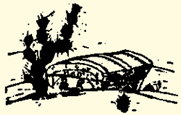 Frank James bought a little farm so that he might have a strategic base from which to search. He would ride daily from his farm to Cache Creek over the piece of trail he once traversed at the head of the most daring band of robbers known to American history. He always covered the distance in a flying gallop, hoping that when he got to the scene of the secreted treasure the doors of memory would flash open. But daily the doors of memory remained locked. Riding thus, he wore out six horses before he galloped away from the Wichitas forever.
Frank James bought a little farm so that he might have a strategic base from which to search. He would ride daily from his farm to Cache Creek over the piece of trail he once traversed at the head of the most daring band of robbers known to American history. He always covered the distance in a flying gallop, hoping that when he got to the scene of the secreted treasure the doors of memory would flash open. But daily the doors of memory remained locked. Riding thus, he wore out six horses before he galloped away from the Wichitas forever.
Thus the treasures of the Wichitas unfold themselves in legend. There is the great government treasure lost to view in the sands and waters of Cache Creek. There is the treasure of Cut Throat Gap—a name that was not bestowed without reason.
![]()
DIAMONDS
Many people on hearing that diamonds have been found in meteorites, imagine that the meteorites are sought as a source of gems. However, no diamond of gem quality has ever been found in any meteorite. Though comparatively numerous in the Barringer meteorite, the diamonds so far discovered have all been of the carbonado variety which consists of microscopic crystals embodied in a matrix of graphic carbon. They are very unattractive in appearance; but are so hard that they scratch carborundum and readily cut grooves in grinding stones made of that material. They have no value.
H H. Ninager, Flagstaff, Ariz.
![]()
TOUGH BIRD
A 3-year old boy who fell off a porch in Coeur d-Alene, Idaho, and broke his leg, explained that a "bird pushed me."
DESERT RAT SCRAP BOOK 5
José Martines tells of a prospector of Ehrenberg, Arizona, who was about to set out on a trip into the Plumosa Mountains. This was in 1868. He had his two burros packed, and the cinches pulled tight. Everything was all set excepting his shovel, which is usually the last thing to pack as it is stuck under two straps that hold the load on the burros. When he picked it up he noticed that the handle was cracked. This meant that he had to get a new one before he could start. He made the rounds of the outfitters of Ehrenberg, Goldwater, Barney, Castenado, and Abraham Franks; but for some reason there wasn't a shovel in town. As he finally came out of the Riverview Saloon, he met a woman who worked in Luggett's Hotel; and when he had told her his difficulty, she loaned him her shovel.
On that trip he found an unworked placer, supposedly near the head of Ferra gulch, from which he took $20,000. He gave the woman exactly half, and the only string tied to the gift was the request that he might keep the shovel.
"Its a damn lucky shovel," he said. "If you'll let me keep it, I won't never have to worry about finding what I need."
From Golden Mirages, by Philip A. Bailey
LEGEND: A lie that has attained the dignity of age.
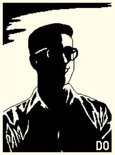
All text was hand-entered (no OCR scans) by Dick Oakes who did the layout, markup and graphics reproduction (all of Harry's misspellings retained). The contents remain the property of Bill Lincoln and his heirs.

